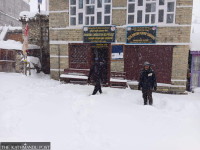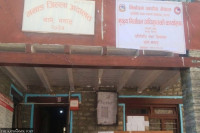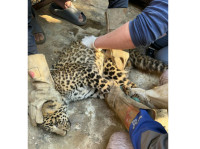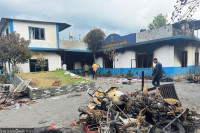Gandaki Province
Local unit plans project to tackle monkey menace
Jaimini Municipality is considering building a ‘conservation park’ for monkeys which they say could be turned into a tourist attraction in the future.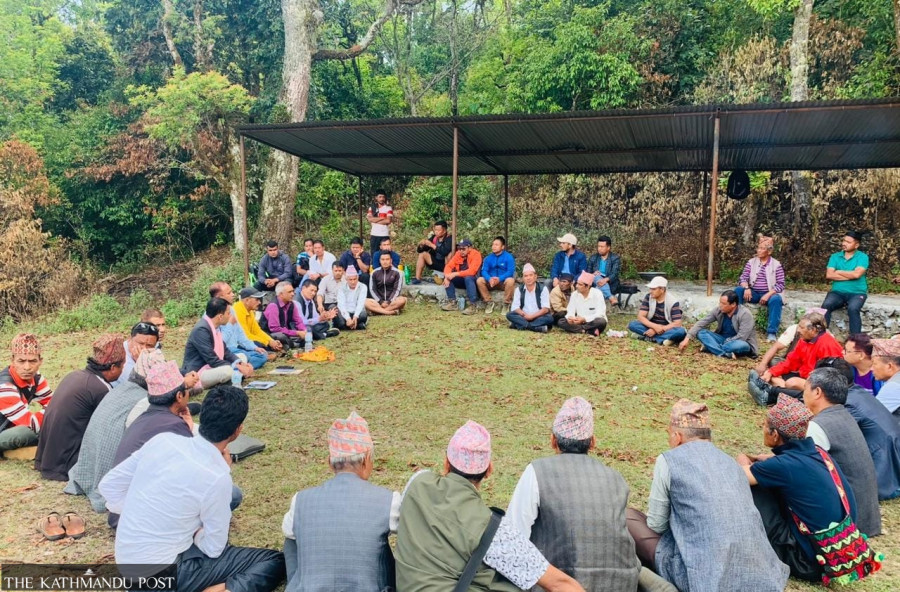
Prakash Baral
Outmigration has increased in several villages of Jaimini Municipality in Baglung due to the threat of monkeys. In a bid to stop the locals from leaving their villages, the local unit plans to build a ‘conservation park’ for monkeys.
“The preliminary work for building a park in Puranogaun Village in ward 8 of the municipality has begun,” said Harihar Sharma, deputy chairman of Jaimini Municipality. “The park is going to be built in 366.29 hectares. The land belongs collectively to the Puranogaun Community Forest, Naule Community Forest, and a national forest. The plan is to catch all the monkeys in the municipality and house them in the conservation park.”
The park will be divided into four blocks, according to Sharma, and will be designed as a natural habitat for monkeys. The municipality plans to make arrangements for food and natural water sources for the monkeys in the park.
In recent years, several districts of Gandaki Province are increasingly coming under siege from a growing population of monkeys. Baglung locals report damage caused to their houses, fields and crops which has forced them to leave their native villages.
The 12th national census conducted in November 2021 and released in March this year showed Jaimini Municipality in Baglung facing a steady population decline. According to the local unit, several households have been leaving the villages for a lack of options.
According to the data of the municipality, in the past decade, around 8,000 people have migrated from the local unit due to monkey terror. More than 1,000 houses are currently empty.
“Monkeys enter our homes fearlessly and steal food from the kitchen and even the storage,” said Ved Bahadur Chhantyal, a local of Ward 3. “They sabotage our fields and crops. In many instances, they have attacked our children and caused serious injuries.”
The municipality’s latest plan also includes turning the conservation park into a tourist destination. “It is imperative that we keep the monkeys away from human settlements. Once the monkeys are settled in, we will open the conservation park for tourists,” said Sharma.
The Division Forest Office, Baglung, has allocated Rs1 million for the park’s feasibility study. Once the feasibility study is conducted, the municipality in coordination with the division forest office will conduct a preliminary study of the proposed park.
“After the preliminary study is done, we will make a DPR and conduct an environmental impact assessment to understand the project better,” said Mukunda Adhikari, divisional forest officer at the Division Forest Office. “The municipality will then have to seek permission from the federal government for the project.”
“The concept of building a park is good as long as we focus on protecting the wild animals rather than controlling and confining them. Building such a park will provide a safe place for monkeys and other animals. It will mitigate human-animal conflicts,” said Nar Bahadur Pun, mayor of the Jaimini Municipality. “It is an ambitious project that stands to benefit humans and animals. Several studies and research about habitat conservation, monkeys’ procreation cycle, and lifestyle needs to be conducted.”
Pun is positive about the longevity of the project and envisions a research centre in the future. “The whole municipality is looking forward to the construction of the park. Rather than living in fear of monkeys, we have the capacity to build a home for them,” said Pun. “We have requested the provincial government to prioritise this project.”
According to Bimal Shreesh, chairman of Jaimini Ward 8, monkeys have made life miserable for everyone in the villages, especially those from the farming community. “Farmers in the municipality have faced major losses in the past years. Their agricultural production has decreased making it hard for them to sustain their livelihood.”
Chhantyal from Ward 3 says that the locals have adopted various methods to keep monkeys from their settlements and fields but none of the methods has worked. “Farmers are encouraged to cultivate crops not preferred by monkeys but in doing so they are losing out on growing crops they need to survive,” said Chhantyal. “From farmers to shopkeepers to children playing on the streets, none are safe from monkeys. That is why most families are leaving the villages.”




 9.89°C Kathmandu
9.89°C Kathmandu.jpg)

